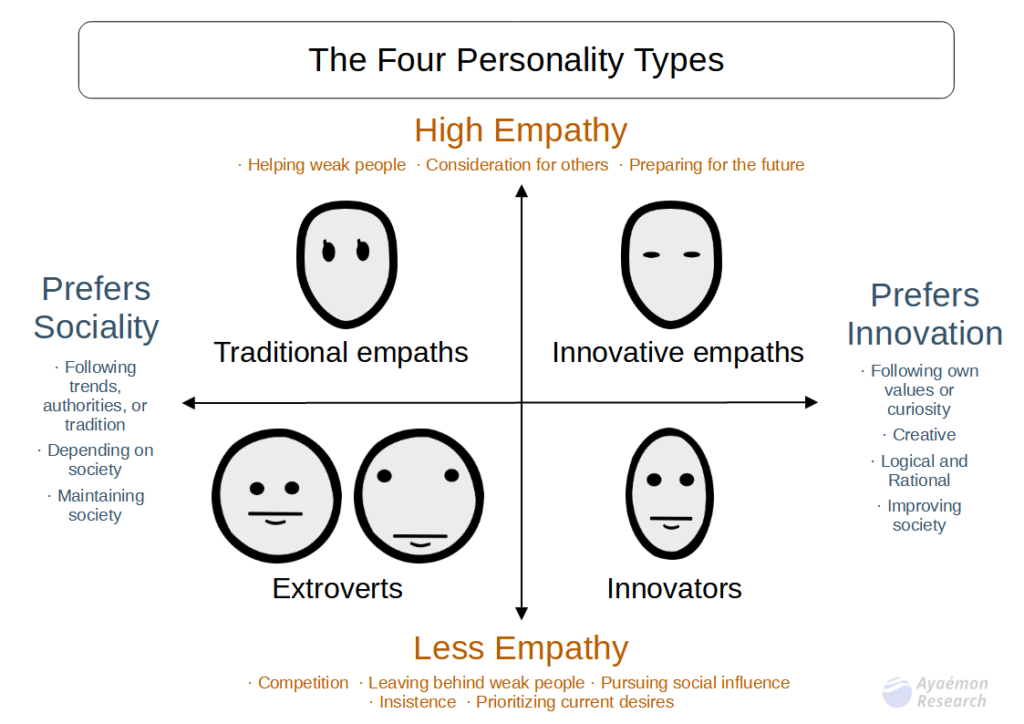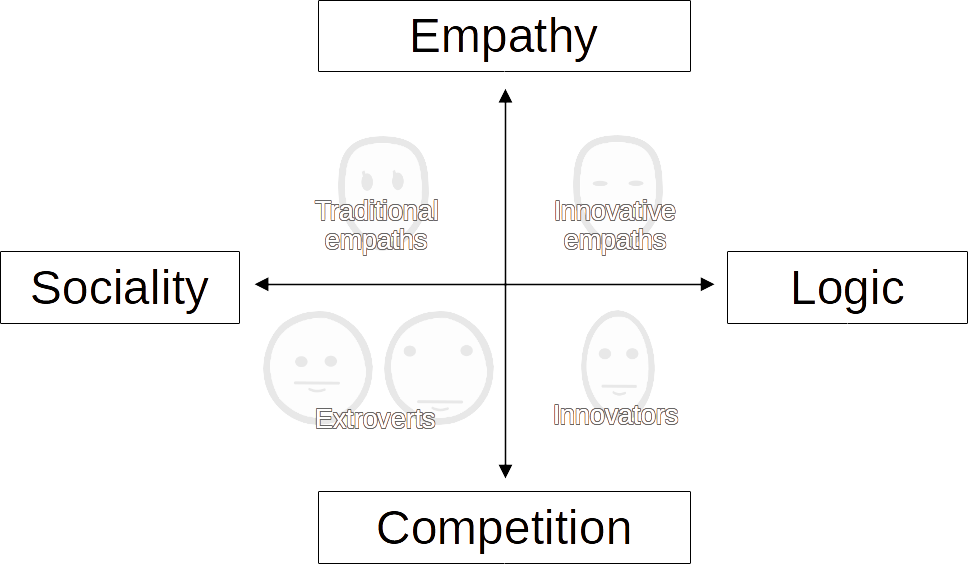Recently, I have introduced a new way to solve our mental problems. Developing logical sense can solve them if we have it.
However, some people have less logical sense. How do they handle intense empathy?
Since I have mentioned this topic several times in earlier articles, I will explain it today.
How other people solve it
Sometimes, we want to know the reason for the actions of people who are different from ourselves. Many people choose things that are different from us. It often surprises us and makes us wonder why.
You may have experienced it many times if you are empathic and logical. This is because empathic, logical people are the minority in personality.

One typical example is empathic, less-logical people. Although they have an empathic nature like us, they often handle empathy entirely differently from us.
Strange nature of empathic, less-logical people
For example, they like to belong to groups or organizations, even if it is for religion. We think spirituality is something that frees us from mental shackles. We want a spirituality that gives us freedom.
On the other hand, they willingly seek limitations. An example is the religious commandments. They seek strict religious rules to discipline themselves and bear them of their own accord.
Examples are prohibiting drinking alcohol, not wearing makeup, shaving their hair, or avoiding the possession of money. In addition, there are many detailed rules, such as mandatory rituals and events.

They make us wonder. Why do they willingly bear them?
If we have too strong empathy, we have to limit it, so we rely on logical sense. However, they are taking more spiritual rules. Does it worsen their intense empathy? How do they deal with their mental problems?
To explain why, I will introduce another way to handle mental problems. Although it would not work for us, it might give us a better understanding of others.
Four types of personalities
There are people with overly high empathy and less logical sense. They use another individuality to limit their intense empathy: sociality.
To explain it, let’s look at the four types of personalities. It is shown in the next figure:

We classify our personalities by two axes: empathy and logical sense.
Two empathic personalities
In this article, we focus on the following two empathic personalities:
- Traditional empaths are empathic but less logical. To limit their intense empathy, they rely on sociality instead of logical sense.
- Innovative empaths are empathic and logical people. They use logical sense to limit their empathy.

Assume we are innovative empaths in this article.
Four senses
People can have four senses, as shown in the following image:

- Empathy and a competitive mind are senses for stability. They limit logical sense and sociality.
- Logic and sociality are senses to change. They limit empathy and a competitive mind.
Another way to limit empathy
Traditional empaths use sociality to limit their intense empathy.
Empathy is also a sense of mimicking others. Copying others’ behaviors, including expressions, allows us to feel their emotions. It is unavoidable because it is based on a brain system called mirror neurons.
It means if people with calm minds surround them, they can be so as well. The more similar individuals around them, the more stable their empathy becomes.

That allows them to calm their empathy. Not only that, but also they can be consistent. They don’t have to struggle with duality. Intense empathy and sociality allow them to live only one aspect of values.
Of course, it has pros and cons. It depends on the personality of the community they belong to. In addition, although they can live consistently with their surroundings, they cannot live alone. They are afraid of being alone. It means that they lose their control over their intense empathy. Perhaps the stress is equivalent to our stress toward social life.
That is why they prefer belonging to a group or an organization. The bigger the group is, the more stable-minded they can be without worries. They can live socially. In other words, they took advantage of their uniqueness.
Unveiling mysterious phenomena
This behavior factor unveils many mysterious phenomena. Let’s see four questions below.
Q.1: About religious organizations
Question 1: Why does religion create organizations?
This is because traditional empaths want it, as explained above. Their first purpose is to belong. Its doctrine is not so important for them.
It means that it is enough as long as they can do something together. They sing together, learn together, meditate together, do charity together, and pray together.

On the other hand, we—innovative empaths—cannot do them. We are not team players. We want to do everything freely. In addition, our focus on religion is its doctrine—its logic, not to belong.
We will find many contradictions between their actions and doctrine. They will not try to reflect on it. That stresses us.
That often makes us wonder about the necessity of religious organization. However, it is necessary for traditional empaths. Their prime goal is to belong.
Q.2: About religious organizations and war
Question 2: Why do religious organizations sometimes arm themselves and cause wars?
This is because they—believers—cannot make logical judgments. Even though the doctrine tells the importance of peace, their first goal is to belong. If their surroundings lean toward offensive, the whole group tends to be so.
That is why traditional empaths often become fanatics.

This also applies to business. They are the type of people who are likely to become dedicated fans. They are cooperative, kind, and people who help our businesses selflessly.
In other words, it depends on the leader. In such groups, the leader changes everything, for better or worse.
Q.3: About religious groups and committing mass suicide
Question 3: Why are there religions that commit mass suicide?
The reason is the same as just above. Traditional empaths cannot judge logically. If their surroundings commit suicide in the ceremony, they unconsciously feel it is natural for them.
Although it feels like someone else’s problem, that applies to us as well.

It is the same state as a mental complex caused by intense empathy. Our society tells us to live as a part of society. It is tantamount to forcing us to commit mental suicide.
If our empathy is too strong, we cannot avoid it. To get out of the ‘mass suicide,’ we have to judge based on logical sense.
Q.4: About membership-based businesses
Final question: Why do innovators often create membership-based businesses like online communities?
This is because they often attract traditional empaths. Traditional empaths are high-quality customers with strong loyalty. They will buy all the products the innovator releases.
That is why religious organizations tend to be wealthy. History proves it. They built a huge church and decorated it with intricate artworks. They have money.

We also often attract traditional empaths if we show creative, logical talents. However, it is difficult for us to do membership-based businesses like innovators, even if it is on a far smaller scale. Managing people stresses us, even if they are traditional empaths, who tend to be calm and peaceful.
Even though we might envy innovators, we have to understand our personality. Sorry, I don’t know effective measures at the moment.
Conclusion
That is another way to handle mental problems.
Traditional empaths can use sociality to limit their intense empathy.
Although it would not work for us, it might give us a better understanding of others.
Thank you for reading this article. I hope to see you in the next one.


